
Did you know your brain—only 2% of your body weight—consumes a whopping 20% of your daily calories? That’s right, your thinking organ is an energy hog of the highest order.
I’m about to show you exactly what to feed your hungry brain for sharper thinking, better memory, and improved mood—no pseudoscience, just research-backed nutrition for the brain that actually works.
Your brain is basically a Ferrari. Premium fuel makes it purr; cheap stuff makes it sputter. And most of us are unknowingly pouring in the equivalent of watered-down gasoline.
But here’s what most “brain food” articles won’t tell you: the timing of when you eat certain foods matters almost as much as what you’re eating. Let me explain…
Understanding Brain Nutrition Fundamentals
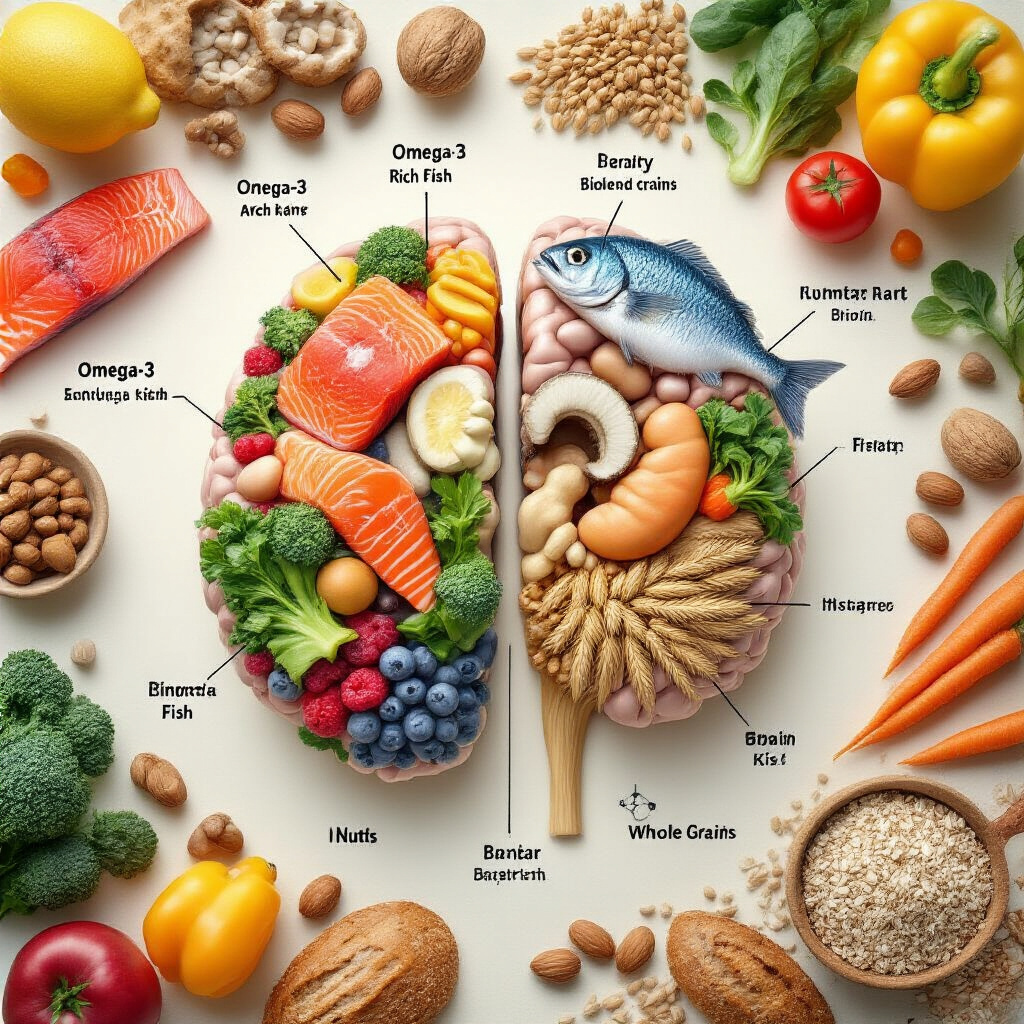
How nutrition directly impacts cognitive function
Your brain is hungry. It’s only 2% of your body weight but gobbles up 20% of your daily calories. Skip breakfast? Your focus tanks. Eat junk food? Your memory suffers.
The science is crystal clear – what you eat literally builds your brain. Those omega-3s in salmon? They become part of your neuron cell membranes. That vitamin E in nuts? It protects your brain cells from damage.
When researchers put people on different diets and scan their brains, the differences jump out. Mediterranean diet followers show more gray matter. Sugar-heavy diets shrink the hippocampus – your memory center.
Key nutrients that power brain health
Your brain plays favorites with nutrients:
- Omega-3 fatty acids: Brain cell builders found in fatty fish, flaxseeds, and walnuts
- Antioxidants: Neuron protectors packed in colorful berries and dark chocolate
- B vitamins: Energy providers that keep brain metabolism humming
- Choline: The memory molecule found in eggs and liver
Missing these brain-boosters isn’t theoretical – it shows up as brain fog, memory lapses, and mood swings before developing into serious cognitive decline.
The brain-gut connection explained
Your gut isn’t just for digestion – it’s your second brain. That butterfly feeling? That’s your gut talking to your brain.
The gut microbiome (those trillions of bacteria) produces neurotransmitters like serotonin that regulate your mood. A bad diet wrecks this delicate ecosystem.
When you eat fiber-rich foods, your gut bacteria produce short-chain fatty acids that reduce brain inflammation. Processed foods do the opposite, triggering inflammatory responses that cloud thinking.
This two-way highway between gut and brain explains why probiotics can improve depression symptoms and why stress gives you stomach aches. Feed your gut right, and your brain reaps the rewards.
Essential Nutrients for Optimal Brain Performance
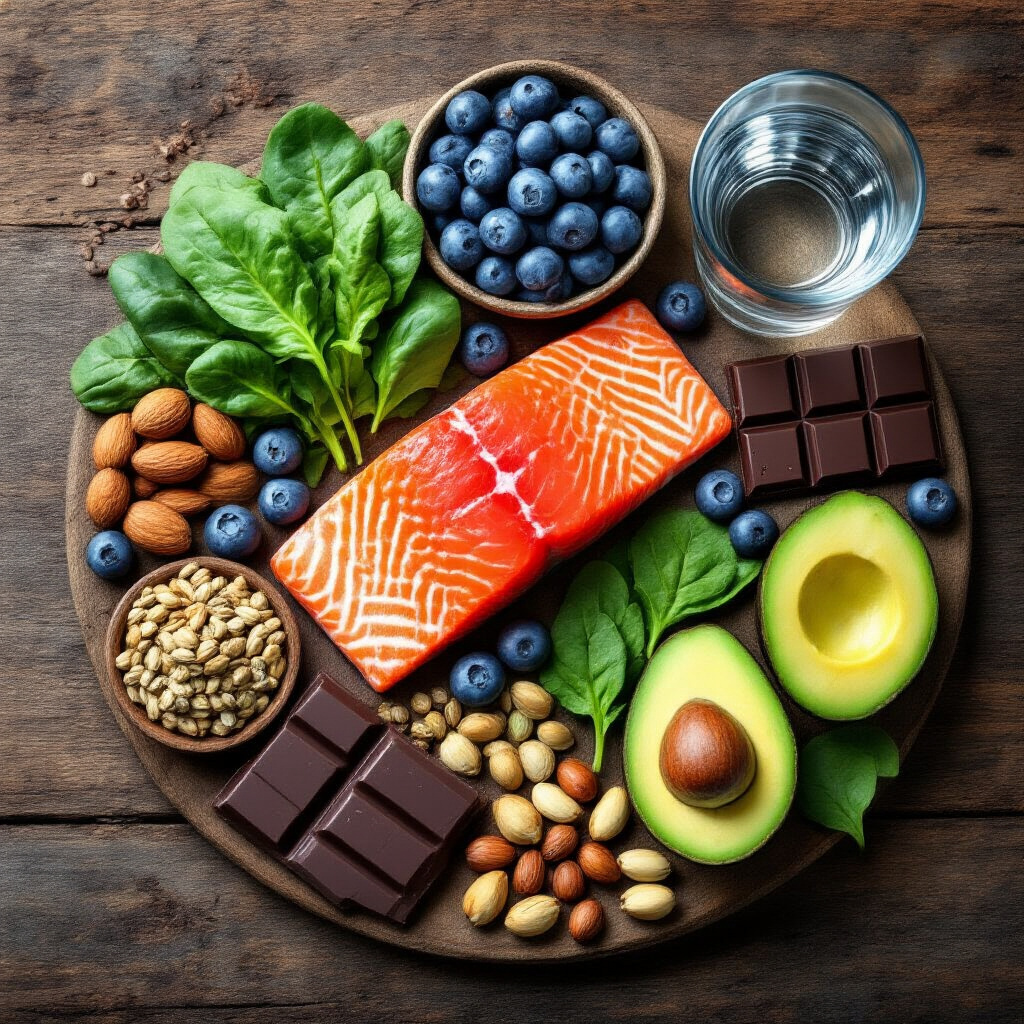
A. Omega-3 fatty acids and their cognitive benefits
Your brain is basically a fat factory – it’s 60% fat! And not just any fat – omega-3s are the VIP guests at this party.
Think about it: DHA (one type of omega-3) makes up about 25% of your brain’s gray matter. That’s huge! When you don’t get enough, your brain literally can’t build the structures it needs.
People who eat omega-3-rich foods regularly show better memory, sharper thinking, and slower brain aging. They’re basically giving their brain a premium upgrade while the rest of us are running on the basic package.
Where to get them? Fatty fish like salmon and mackerel are omega-3 superstars. Not a fish fan? Try walnuts, flaxseeds, or chia seeds instead.
B. Antioxidants that protect brain cells
Your brain burns through oxygen like crazy – about 20% of your body’s supply. This creates tons of free radicals that damage brain cells.
Antioxidants are your brain’s bodyguards. They neutralize these threats before they can do harm.
Berries are antioxidant powerhouses – especially blueberries, which have been shown to actually reverse age-related memory decline. Dark chocolate (70%+ cocoa) isn’t just delicious – it’s packed with brain-protecting compounds too.
Green tea contains L-theanine and catechins that cross the blood-brain barrier and provide direct protection. And colorful veggies? The more vibrant the color, the more antioxidants they typically contain.
C. B vitamins for mental clarity and focus
Brain fog is real, and B vitamins are often the solution.
B vitamins help your body convert food into energy – specifically the glucose your brain cells are constantly hungry for. Without enough B6, B12, and folate, your brain’s energy production gets sluggish.
These vitamins also help maintain the myelin sheaths that protect your neurons – think of them as the insulation around electrical wires. When they break down, signals get scrambled.
B12 deficiency is particularly sneaky. Your memory slips, you feel confused, and you might blame it on “just getting older” when really your brain is starving for this essential nutrient.
Great sources? Eggs, leafy greens, legumes, nutritional yeast, and animal proteins.
D. Protein’s role in neurotransmitter production
Your thoughts, feelings, and memories all depend on neurotransmitters – chemical messengers that zip between brain cells.
Guess what they’re made from? Amino acids – the building blocks of protein.
Without enough protein, your brain simply can’t produce sufficient dopamine, serotonin, or norepinephrine. That’s why low-protein diets often lead to brain fog, mood swings, and poor concentration.
Tryptophan (found in turkey, eggs, and cheese) creates serotonin, your “feel good” neurotransmitter. Tyrosine (abundant in almonds, avocados, and bananas) produces dopamine, which controls your motivation and reward systems.
The quality of protein matters too. Complete proteins containing all essential amino acids give your brain the full toolkit it needs.
E. Minerals that support neural pathways
Zinc, magnesium, iron – these aren’t just random elements on the periodic table. They’re crucial brain allies.
Magnesium regulates neurotransmitter release and has been called “nature’s calm-down mineral.” Low levels are linked to anxiety, insomnia, and even migraines.
Iron helps deliver oxygen to your brain. Without enough, your thinking speed and attention span take a serious hit. Women are especially vulnerable to iron deficiency.
Zinc plays a key role in axonal and synaptic transmission. In plain English: it helps your brain cells talk to each other properly.
The modern diet is often mineral-deficient thanks to depleted soils and processed foods. Pumpkin seeds, dark chocolate, leafy greens, and shellfish are excellent mineral sources to keep your neural pathways firing optimally.
Brain-Boosting Foods to Include in Your Diet
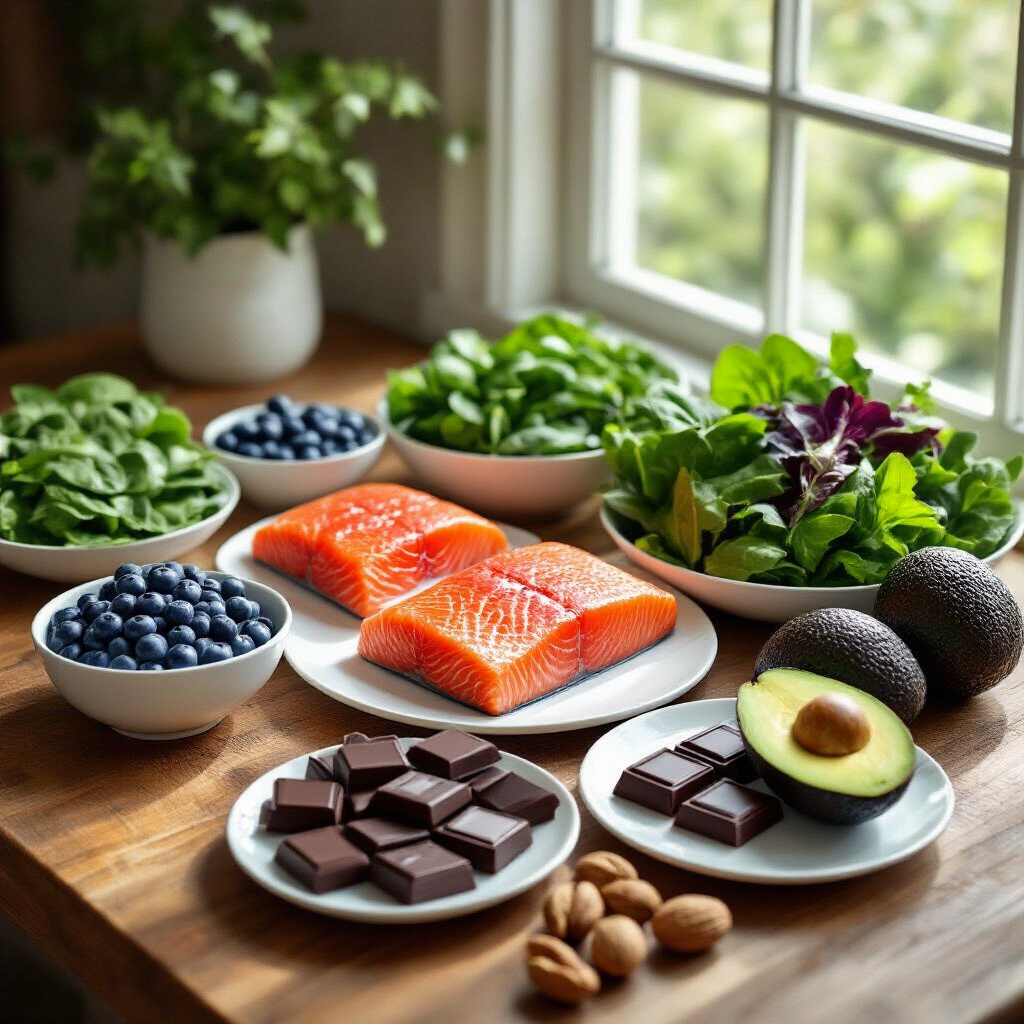
Fatty fish for omega-3s and protein
Your brain is literally made of fat—60% of it, actually. And not just any fat. The omega-3 fatty acids in fish are like premium fuel for your brain cells.
Salmon, mackerel, and sardines aren’t just dinner options—they’re brain power on a plate. These fatty fish are packed with DHA, a type of omega-3 that helps build brain cell membranes and reduces brain inflammation.
People who eat fish regularly? They have more gray matter in their brains. That’s not just interesting—it’s the stuff that processes information, stores memories, and controls your emotions.
Can’t stand fish? No worries. Try a high-quality fish oil supplement. But nothing beats the real thing, especially when it comes with a side of protein that helps keep you mentally alert.
Berries and their neuroprotective properties
Blueberries, strawberries, blackberries—they’re not just Instagram-worthy. These tiny fruits pack a serious punch against brain aging.
The secret? Flavonoids—plant compounds that give berries their vibrant colors. These aren’t just pretty—they actually fight oxidative stress and inflammation in your brain.
Studies show people who eat more berries delay memory decline by up to 2.5 years. That’s an extra 2.5 years of remembering where you put your keys!
Toss them in your morning oatmeal, blend them in smoothies, or just grab a handful as a snack. Your brain will thank you later.
Leafy greens packed with brain-friendly nutrients
Dark leafy greens might not be exciting, but your brain absolutely loves them.
Spinach, kale, and collards are loaded with vitamin K, lutein, folate, and beta carotene. These nutrients slow cognitive decline and keep your brain younger than your birthday says it should be.
One study found people who ate just one serving of leafy greens daily had brains that performed like they were 11 years younger. Eleven years!
Not a salad fan? Sneak them into smoothies, omelets, or pasta sauces. Your brain doesn’t care how you get them—it just wants those nutrients.
Nuts and seeds for healthy fats
A handful of nuts might be the simplest brain hack there is.
Walnuts (which even look like tiny brains—coincidence?) are packed with DHA. Almonds and hazelnuts deliver vitamin E, which shields your brain cells from oxidative stress.
Pumpkin seeds offer zinc and magnesium—critical minerals for nerve signaling. Sunflower seeds bring more vitamin E to the table.
The best part? Research shows nut lovers have sharper memories and better processing speeds. Just watch your portions—they’re calorie-dense. A small handful daily is your brain’s sweet spot.
Keep a mix in your desk drawer for afternoon slumps. Your 3 PM brain fog doesn’t stand a chance.
Hydration and Brain Function
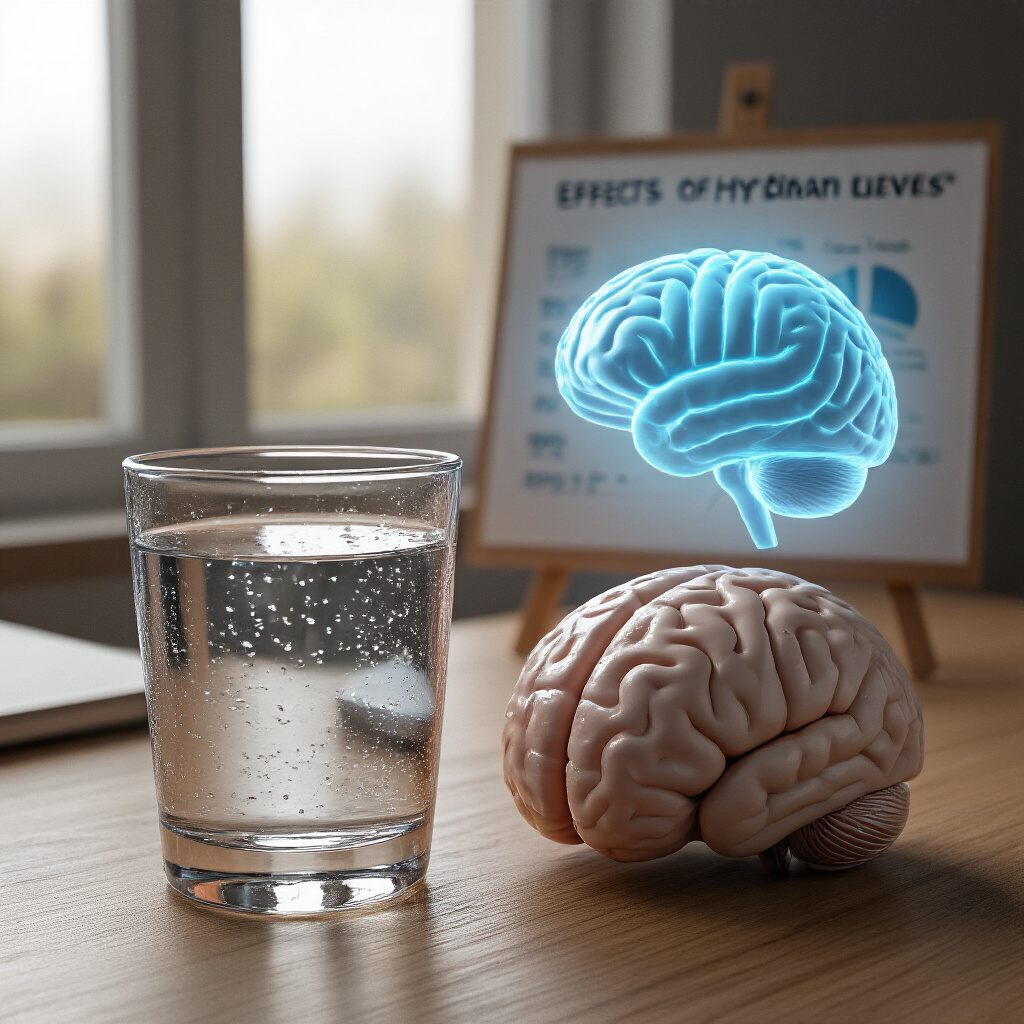
How dehydration impairs cognitive abilities
Ever gone through a day where your brain just feels foggy? You might be dehydrated.
Your brain is about 75% water, and it shows when you don’t drink enough. Even mild dehydration (losing just 1-2% of your body’s water) can mess with your thinking skills.
Brain scans show that when you’re thirsty, your brain actually has to work harder to complete the same tasks. Memory takes a hit, reaction times slow down, and those math problems? Way tougher than they should be.
Why does this happen? Water helps transport nutrients to your brain and removes toxins. Without enough fluid, everything slows down like a traffic jam during rush hour.
The signs are subtle but real: headaches, trouble focusing, mood swings, and feeling tired for no reason. Next time you can’t remember where you put your keys, grab a glass of water before blaming your memory.
Optimal daily water intake for brain health
So how much should you drink? The “eight glasses a day” rule isn’t based on much science.
Instead, aim for:
- Women: About 11.5 cups (2.7 liters) daily
- Men: About 15.5 cups (3.7 liters) daily
But these numbers include water from food (about 20% of your daily intake).
Your personal needs depend on:
- Your weight and size
- Activity level
- Climate you live in
- Health conditions
A simple check? Your urine should be pale yellow, not clear or dark.
Brain-friendly beverages beyond water
Water isn’t your only option for hydration. These drinks offer extra brain benefits:
Green tea contains L-theanine that boosts alpha waves in your brain, creating alert relaxation without the jitters of coffee.
Coconut water delivers electrolytes that help your neurons fire properly. Think of it as nature’s sports drink without the artificial stuff.
Beetroot juice increases blood flow to the brain, potentially improving performance during challenging mental tasks.
Small amounts of coffee (1-2 cups daily) may help protect brain cells and boost short-term memory and reaction time.
Skip sugary drinks and alcohol though – they actually pull water from your body and brain, leaving you worse off than before.
Dietary Patterns That Enhance Brain Health
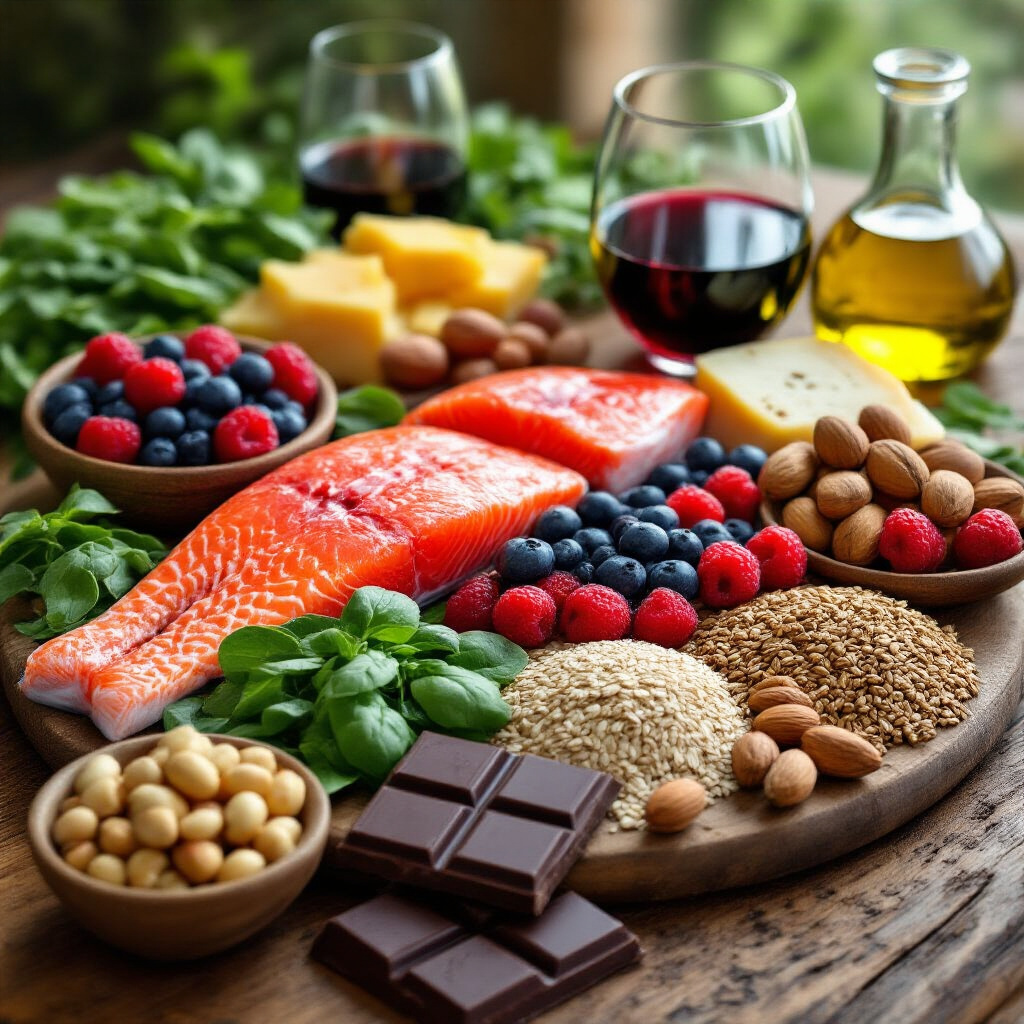
A. The Mediterranean diet’s cognitive benefits
Ever wondered why people living around the Mediterranean seem to stay mentally sharp well into old age? It’s not just the beautiful coastlines—their diet plays a major role.
The Mediterranean diet isn’t complicated. It’s mostly vegetables, fruits, whole grains, fish, olive oil, and the occasional glass of red wine. Simple, right? But the brain benefits are extraordinary.
Studies show people who stick to this eating pattern have up to 40% lower risk of cognitive decline. Your brain literally ages slower. One landmark study found that brain scans of Mediterranean diet followers showed significantly less brain shrinkage compared to typical Western diet eaters.
Why does it work so well? The omega-3 fatty acids in fish reduce inflammation and build brain cell membranes. The antioxidants in colorful veggies fight oxidative stress. And olive oil? It’s packed with compounds that protect brain cells from damage.
B. MIND diet specifically designed for brain health
The MIND diet is like the Mediterranean diet’s brainy cousin—specifically engineered for your neurons.
MIND stands for Mediterranean-DASH Intervention for Neurodegenerative Delay. It cherry-picks the brain-boosting foods from other diets and creates a cognitive powerhouse eating plan.
The rules are straightforward: eat leafy greens daily, berries at least twice weekly, nuts most days, beans every other day, whole grains three times daily, fish weekly, poultry twice weekly, and olive oil as your main cooking fat.
The results speak for themselves. People following the MIND diet slashed their Alzheimer’s risk by 53%. Even moderate followers saw a 35% risk reduction.
What makes it special? The emphasis on berries (especially blueberries) and green leafy vegetables—both proven brain protectors. Blueberries improve signaling in brain cells and green leafies provide critical nutrients that slow cognitive decline.
C. Intermittent fasting effects on neural regeneration
Giving your body regular breaks from eating does something remarkable—it triggers your brain to grow new cells.
Intermittent fasting isn’t about starving yourself. It’s about timing your meals. The most common approach is eating within an 8-hour window and fasting for 16 hours (mostly overnight when you’re sleeping anyway).
When you fast, your body flips a metabolic switch. It starts producing ketones for fuel instead of glucose. Your brain loves ketones—they boost production of a protein called BDNF (brain-derived neurotrophic factor), nicknamed “brain fertilizer” because it stimulates new neuron growth.
Research shows intermittent fasting improves memory, learning, and mental clarity. It also helps clear out damaged cells and proteins linked to Alzheimer’s and Parkinson’s diseases.
The best part? You don’t need to fast for days. Even a 12-hour overnight fast (stop eating after dinner, eat breakfast 12 hours later) shows benefits.
D. Plant-based eating for reduced inflammation
Your brain hates inflammation. It’s like kryptonite for cognitive function. And guess what fights inflammation better than almost anything? Plants.
A plant-rich diet floods your body with antioxidants and phytonutrients that calm inflammatory responses. Less inflammation means better blood flow to your brain, more efficient neural communication, and slower cognitive aging.
The evidence is compelling. People who eat mostly plants show less cognitive impairment and lower rates of dementia. One study found that just adding one serving of leafy greens daily made brains function as if they were 11 years younger!
The inflammation-fighting superstars include:
- Berries (especially dark ones)
- Cruciferous veggies (broccoli, cauliflower)
- Leafy greens
- Nuts and seeds
- Beans and lentils
- Spices like turmeric and ginger
You don’t need to go fully vegan. Even shifting to a 70% plant-based diet can dramatically reduce inflammatory markers in just weeks.
Nutrients to Limit for Brain Protection
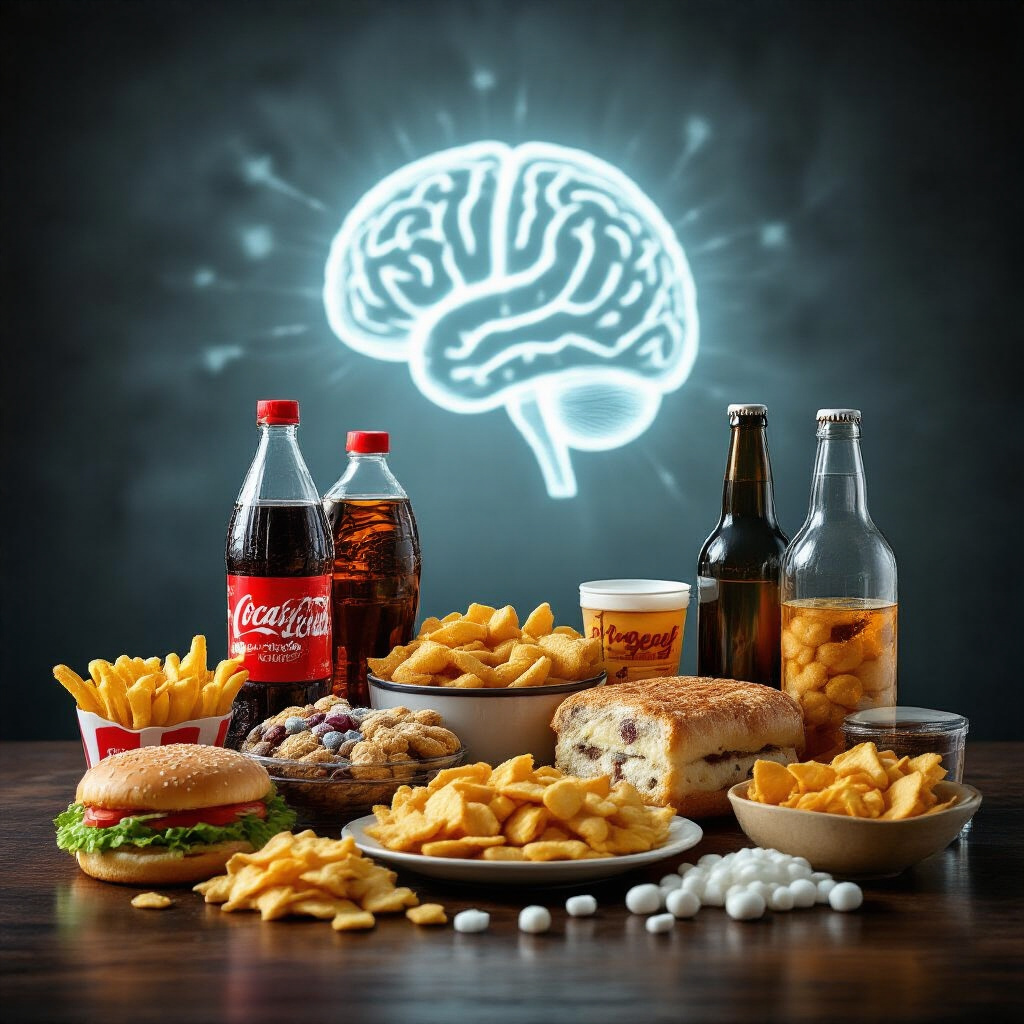
A. Sugar’s negative impact on cognitive function
Your brain is a sugar hog. It demands glucose 24/7, but too much of the sweet stuff is like kryptonite for your neurons.
When you slam down that donut or slurp a sugary soda, your brain gets hit with a glucose spike that feels amazing… for about 20 minutes. Then comes the crash. Your focus scatters. Your memory gets fuzzy. Your brain fog rolls in.
Studies show that high-sugar diets shrink the hippocampus—the memory center of your brain. They also slow down brain cell formation and trigger inflammation that damages neural connections.
The worst part? Sugar is addictive. It hijacks your brain’s reward system, making you crave more and more, creating a vicious cycle of cognitive decline.
B. Trans fats and brain inflammation
Trans fats are the zombies of the food world—artificially created monsters that never should have existed.
Found in fried foods, processed snacks, and many baked goods, trans fats don’t just expand your waistline—they literally shrink your brain. They trigger persistent inflammation that damages brain cells and disrupts communication between neurons.
Research links higher trans fat consumption with:
- Reduced brain volume
- Increased risk of Alzheimer’s
- Poorer memory performance
- Slower cognitive processing
When you eat trans fats regularly, you’re essentially building roadblocks in your neural highways. Your thoughts can’t flow smoothly, your recall stutters, and your mental agility takes a nosedive.
C. Excessive alcohol and neuron damage
I’m not here to ruin happy hour, but your brain has some serious beef with that fifth cocktail.
While moderate drinking might have some benefits, crossing into “excessive” territory is neurotoxic. Alcohol directly kills brain cells, damages the protective coating around neurons, and shrinks brain tissue.
The frontal lobe—responsible for decision-making, impulse control, and personality—takes the biggest hit. That’s why heavy drinkers often show poor judgment and personality changes over time.
Alcohol also steals precious B vitamins your brain needs for energy production and maintenance. Without them, your cognitive functions start breaking down like an old car running on fumes.
The damage isn’t always reversible. While your brain has amazing healing abilities, years of heavy drinking create scars that never fully fade.
Supplementing for Brain Health
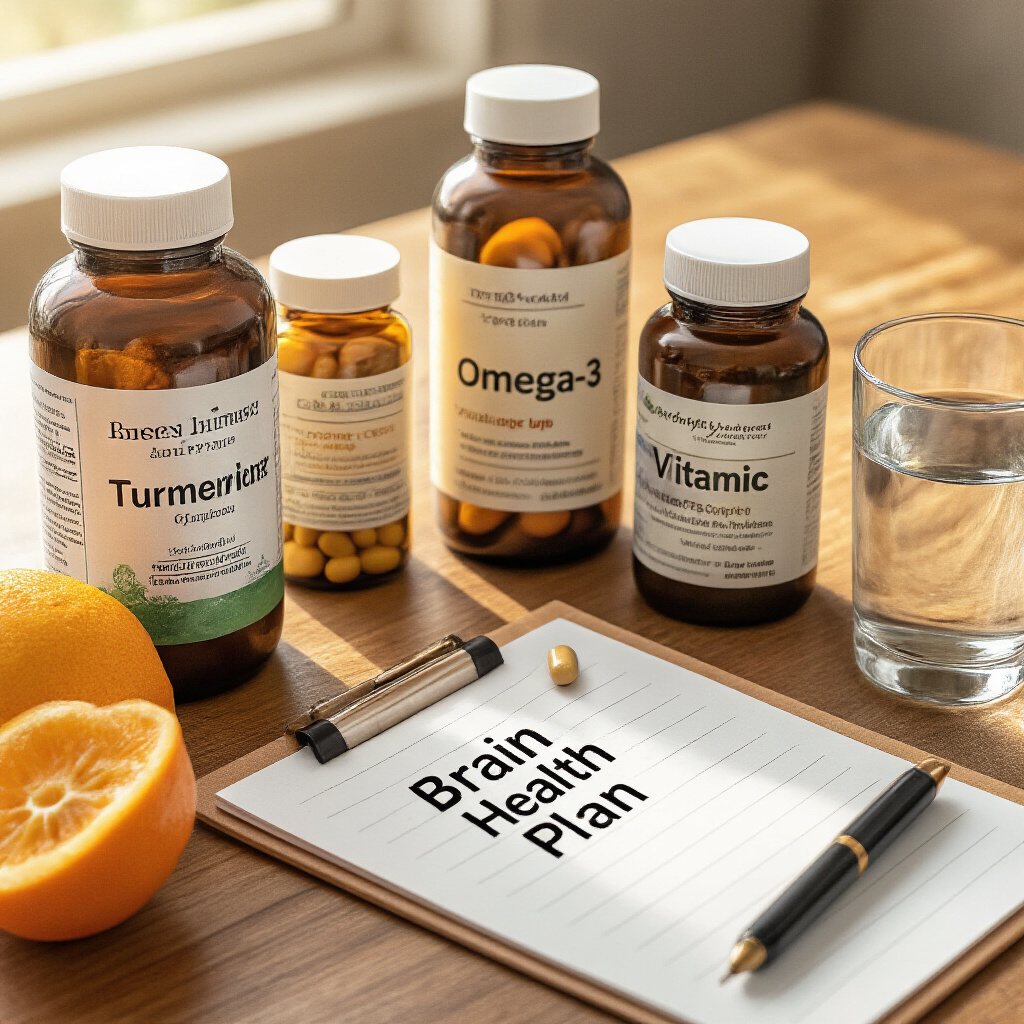
A. When supplements become necessary
You know those days when you just can’t seem to eat right? Maybe you’re traveling, stressed, or just plain busy. That’s when brain-boosting supplements can help fill the gaps.
Supplements aren’t meant to replace real food. But they become necessary when:
- Your diet consistently lacks certain nutrients
- You have absorption issues (like celiac disease)
- You’re vegan or vegetarian (B12 can be hard to get)
- You’re over 50 (absorption naturally declines)
- You’re dealing with intense mental demands or stress
- You live somewhere with limited food variety
Think of supplements as your backup plan, not your main strategy.
B. Evidence-backed brain supplements
Skip the snake oil. These supplements actually have science behind them:
- Omega-3 fatty acids – These DHA-rich supplements improve memory and slow cognitive decline
- B vitamins – B6, B12, and folate support neurotransmitter production and protect against brain shrinkage
- Vitamin D – Critical for brain function and mood regulation
- Phosphatidylserine – Helps maintain cellular function in the brain
- Bacopa Monnieri – Improves memory and reduces anxiety
- Lion’s Mane Mushroom – Stimulates nerve growth factor production
- Magnesium – Supports learning and memory
Just remember, results vary person to person. What works wonders for your friend might do nothing for you.
C. How to choose quality brain supplements
The supplement aisle can be overwhelming. Here’s how to cut through the noise:
- Look for third-party testing – NSF or USP certifications mean someone’s checking the quality
- Check the ingredient list – Avoid artificial colors, fillers, and unnecessary additives
- Research the company – How long have they been around? Do they share their research?
- Read the fine print – What form of the nutrient are they using? Is it bioavailable?
- Consider price (but not too much) – Super cheap often means super low quality
Always look for evidence over marketing claims. If it sounds too good to be true, it probably is.
D. Working with healthcare providers on supplement plans
Don’t go it alone. Working with healthcare providers on supplements is smart because:
- They can test for specific deficiencies
- They’ll catch potential medication interactions
- They know which forms of nutrients work best
- They can help you track results objectively
Bring your supplement bottles to appointments. Take photos of labels if you can’t bring the actual bottles. And be honest about everything you’re taking—even that “miracle” supplement your neighbor swears by.
A good provider won’t dismiss your interest in supplements. They’ll help you integrate them into a holistic plan that includes diet, exercise, and other lifestyle factors.
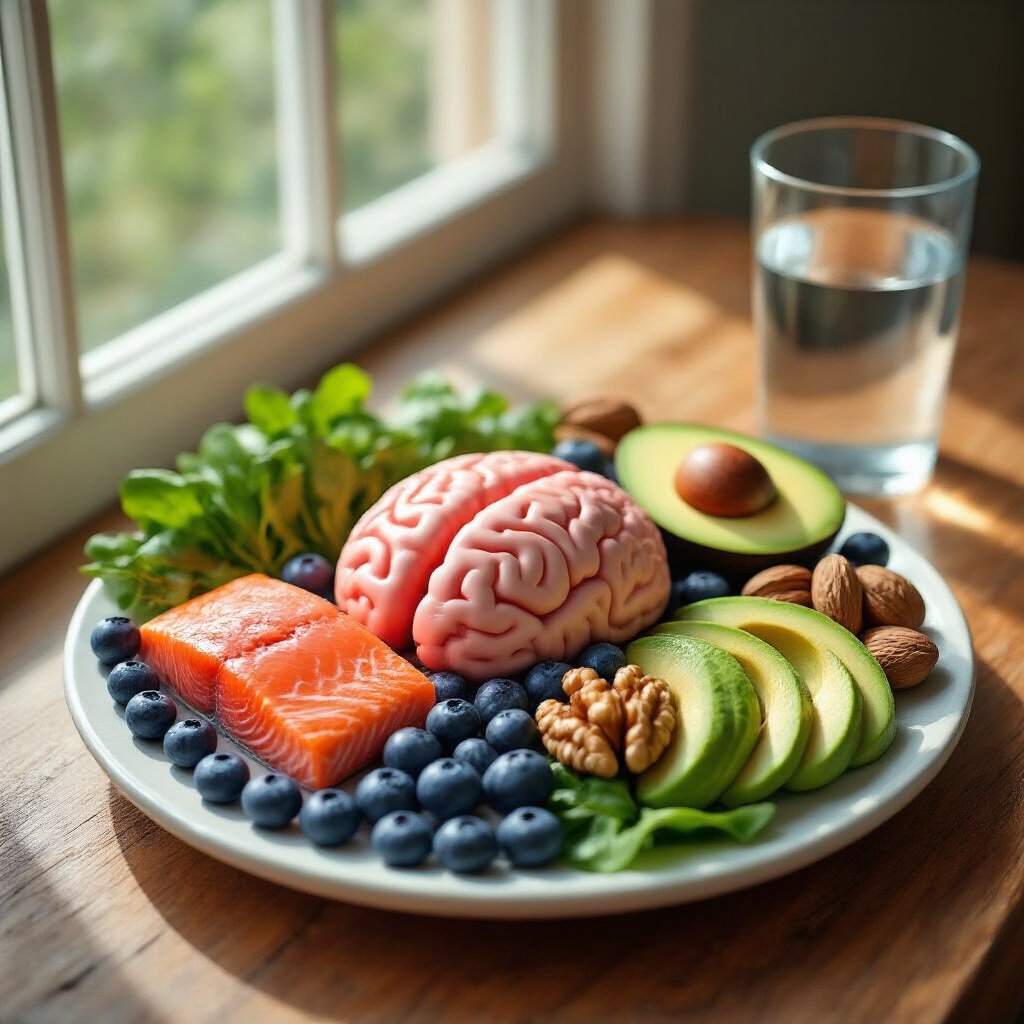
Fueling your brain with the right nutrients is essential for optimal cognitive function and long-term brain health. From omega-3 fatty acids found in fatty fish to antioxidants in colorful berries, the foods you choose daily significantly impact your mental performance, memory, and focus. Equally important is staying well-hydrated and following brain-healthy dietary patterns like the Mediterranean or MIND diets, while limiting processed foods, excessive alcohol, and added sugars.
Making these nutritional choices isn’t just about enhancing your cognitive abilities today—it’s an investment in your brain’s future. Start by incorporating more whole, nutrient-dense foods into your meals, drinking plenty of water, and considering appropriate supplements when necessary. Your brain deserves the best fuel possible, and with these nutrition strategies, you’ll be providing exactly what it needs to thrive.

